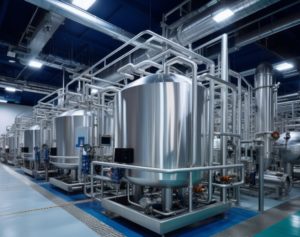The field of pump technology is undergoing a significant transformation with the integration of magnetic coupling. This innovative approach marks a departure from conventional methods, offering new solutions to fluid handling challenges. Its unique properties set a new standard in the industry, providing both efficiency and reliability.
Magnetic coupling stands out for its significant impact on pump technology, enhancing operational safety and environmental sustainability. Its adoption in fluid handling systems represents more than a mere technical update; it’s redefining industry standards.
This article examines its critical role as a crucial element in optimizing fluid management.

The Mechanics of Magnetic Coupling
Magnetic coupling in pump technology is a novel method that facilitates the transfer of force between two elements without direct physical contact. This system comprises two key components: the driving magnet and the driven magnet.
These magnets are strategically positioned—the driving magnet is typically attached to the motor’s shaft, and the driven magnet is connected to the pump’s impeller. Separating these magnets is a critical element known as the containment shell, a non-magnetic barrier that ensures separation while allowing magnetic interaction.
Advancements In Magnetic Coupling For Pumps
The use of magnetic coupling in pumps was initially introduced as a solution to reduce leaks and maintenance issues in industrial environments. As the technology evolved, significant enhancements were achieved, notably in the amplification of magnetic force and the use of advanced, durable materials. These advancements have extended the systems’ lifespan and made them suitable for diverse applications, from delicate medical equipment to robust industrial machinery.
Further advancements include precision engineering in the design of magnetic components. This refinement has led to more versatile magnetic couplings capable of operating efficiently under varying pressure and temperature conditions. Innovations in modular design also allow for easier customization, enabling the technology to be tailored to specific operational requirements.
This adaptability ensures magnetic coupling systems remain relevant and effective across various industries, enhancing their appeal and scope of application.
Benefits Of Magnetic Coupling In Pumps
Magnetic coupling has brought about significant changes in pump operations, introducing a range of benefits in fluid handling. This technology is noteworthy for its potential to improve operational aspects and address some conventional challenges encountered by pump systems.
- Enhanced Safety And Leak Prevention: One of the benefits of magnetic coupling in pumps is the significant enhancement in operational safety, primarily through leak prevention. Its design, which eliminates the need for a direct mechanical link between the motor and the pump, inherently reduces the risk of leaks. This is particularly beneficial when handling hazardous fluids, as it minimizes the potential for environmental contamination and workplace hazards.
- Increased Efficiency And Energy Savings: Magnetic coupling systems are also recognized for their efficiency. The transfer of energy through magnetic fields tends to be more direct and suffers less mechanical loss compared to traditional couplings. This efficiency translates to lower energy consumption and cost savings over the lifespan of the pump. Additionally, the reduced mechanical friction contributes to less wear and tear, further enhancing the pump’s efficiency and reliability.
- Reduced Maintenance And Longer Lifespan: The absence of physical contact between moving parts in magnetic couplings leads to significantly reduced wear and tear. This reduction in mechanical stress means fewer maintenance requirements and a longer operational lifespan for the pump. It also contributes to more consistent performance over time, reducing the likelihood of unexpected downtime due to equipment failure.
These benefits demonstrate why magnetic coupling is becoming increasingly popular in pumps.

Applications In Fluid Handling
Magnetic coupling technology has found its place in a wide array of fluid handling applications, which include:
- Industrial And Chemical Processing: In industrial and chemical sectors, magnetic coupling pumps are crucial for safely handling sensitive or volatile substances. Their leak-prevention capability is essential in minimizing environmental and safety risks. These pumps also thrive under the rigorous conditions typical in chemical processing, demonstrating durability and reliability.
- Pharmaceutical And Biotech Industries: The precise, contamination-free operation of magnetic coupling pumps aligns with stringent process controls in the pharmaceutical and biotech industries. They’re particularly valuable in applications demanding high hygiene and contamination control, like sterile product manufacturing and sensitive biological material handling.
- Water Treatment And Environmental Applications: In water treatment and environmental management, these pumps are favored for their efficiency and leak-proof operation. They’re integral in wastewater handling, water purification, and chemical management within treatment processes, contributing to the consistent and effective functioning of these systems.
These applications show how adaptable and efficient magnetic coupling is across various sectors. This further emphasizes its important role in modern fluid handling solutions.
Final Thoughts
Magnetic coupling in pump technology marks a significant innovation, addressing challenges like leak prevention and maintenance while enhancing safety and efficiency in fluid handling. Its adoption across diverse industries highlights its versatility and substantial impact.
Looking ahead, further advancements in efficiency and reliability are expected. Such improvements will continue to position this technology as a key player in pump systems across various sectors.
In conclusion, magnetic coupling isn’t just a technical upgrade, but a paradigm shift in fluid handling, setting a new standard for future developments.

